We’ve handpicked 10 exceptional books that are set to become your new productivity partners. These books are like gold mines, brimming with practical advice, strategies, and insights about efficiency and time management. They’re filled with actionable tips, enlightening insights, and innovative ideas that will help you lead a more balanced life in all aspects, not just professionally.
So, whether you’re a productivity enthusiast looking to deepen your understanding, a professional seeking to enhance your efficiency, or just someone striving for a more organized lifestyle, these books are perfect for you. They’re packed with techniques that are not only highly effective but also easy to implement.
So, get ready to elevate your productivity journey!
1. Deep Work by Cal Newport
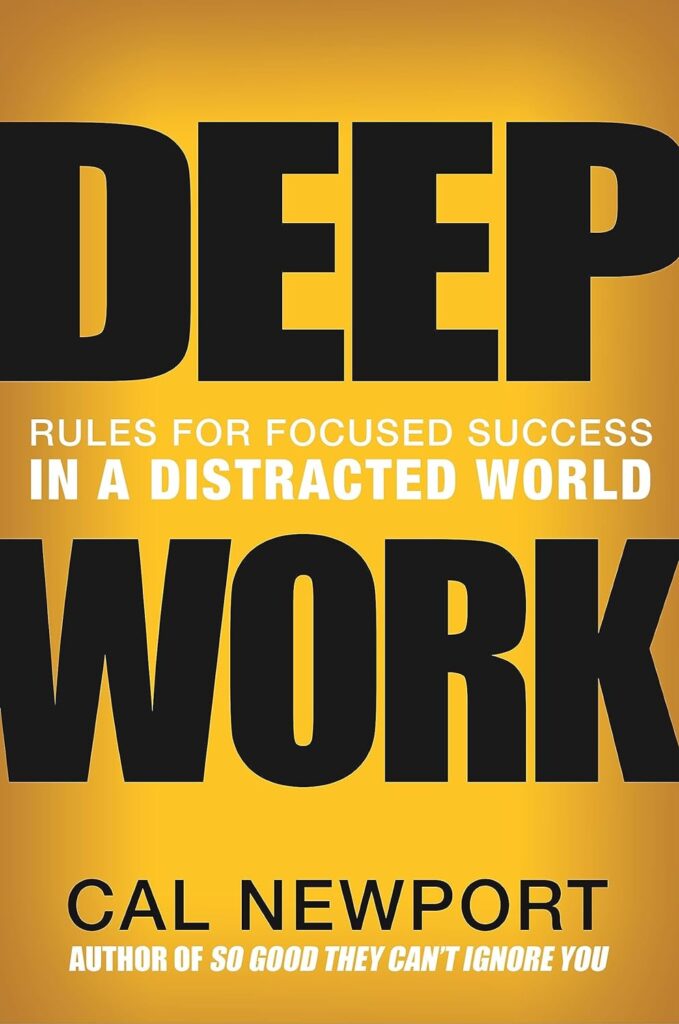
“Deep Work: Rules for Focused Success in a Distracted World” by Cal Newport is a compelling exploration of the concept of ‘deep work’. The book is divided into two parts.
In the first part, Newport argues that deep work, which he defines as the ability to focus without distraction on a cognitively demanding task, is a valuable and increasingly rare skill in our economy. He suggests that mastering this skill can lead to extraordinary results, including quickly mastering complicated information and producing better results in less time.
In the second part, Newport presents a rigorous training regimen, presented as a series of four “rules,” for transforming your mind and habits to support this skill. These rules are designed to help you cultivate a deep work ethic, which Newport argues can produce massive benefits in almost any profession.
The book is a mix of cultural criticism and actionable advice, taking the reader on a journey through memorable stories and no-nonsense advice. It serves as an indispensable guide to anyone seeking focused success in a distracted world. It’s a thought-provoking read that challenges the reader to reconsider their work habits and the impact of distraction on their productivity.
2. Getting Things Done by David Allen
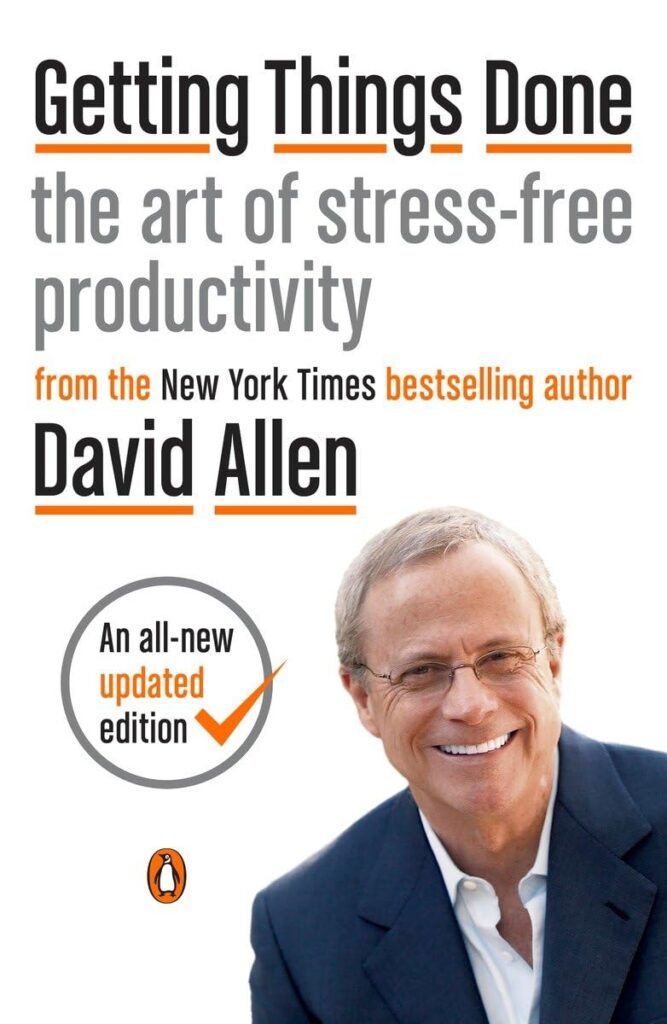
“Getting Things Done: The Art of Stress-Free Productivity” by David Allen is a highly influential book that presents a method for increasing productivity and reducing stress. The book is divided into three parts.
In the first part, Allen introduces the concept of ‘Getting Things Done’ (GTD), a productivity system that helps you organize your tasks and priorities in a manageable way. The GTD method is unique in that it allows you to know what you are currently working on and what you plan on doing next.
The second part provides practical steps to implement the GTD system. These steps include setting up the time, space, and tools; capturing your “stuff”; getting “in” to empty; organizing your tasks into the right categories; reflecting on your tasks to keep them fresh and functional; and engaging with your tasks to make the best action choices.
In the third part, Allen discusses the power of key principles such as the capturing habit, the next-action decision, and the outcome focusing. He also explores the relationship between GTD and cognitive science, and provides guidance on the path to GTD mastery.
The central premise of the book is that our productivity is directly proportional to our ability to relax. Only when our minds are clear and our thoughts are organized can we achieve effective productivity and unleash our creative potential.
Overall, “Getting Things Done: The Art of Stress-Free Productivity” offers a comprehensive guide to improving productivity and reducing stress. It’s a valuable resource for anyone looking to bring more organization and efficiency into their personal and professional life.
3. The One Thing by Gary Keller and Jay Papasan
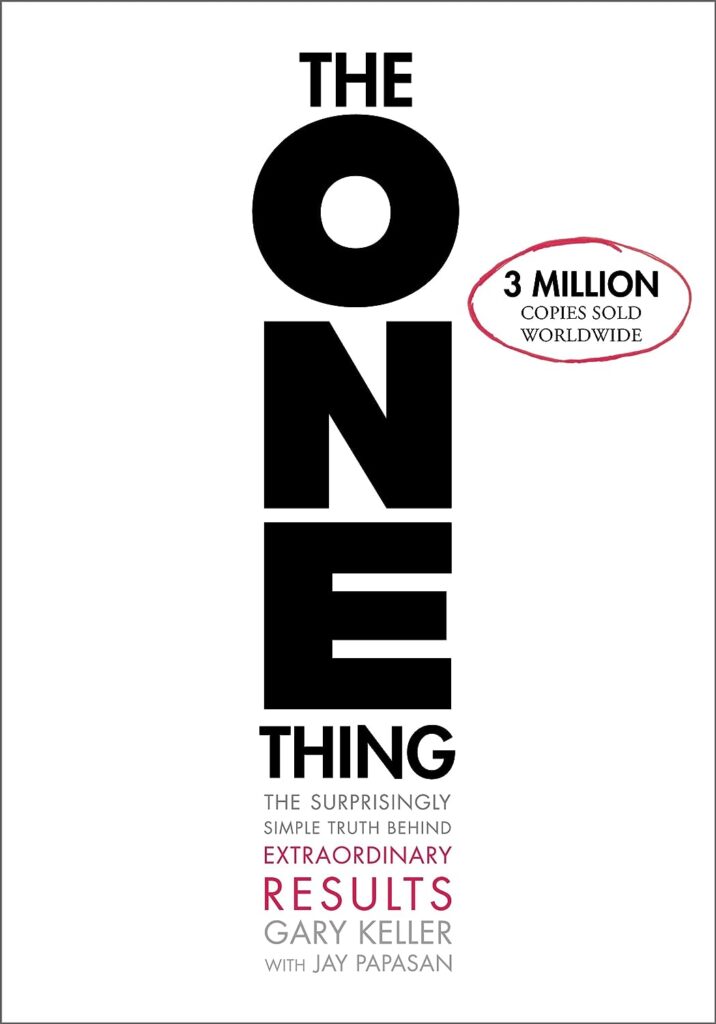
“The One Thing” is a book by Gary Keller and Jay Papasan that emphasizes the power of focusing on a single task. The authors argue against multitasking, which often leads to poor results and stress. They propose that by prioritizing and focusing on one important task at a time, we can achieve extraordinary results and build momentum towards our ultimate goals.
The book introduces the concept of the “ONE Thing”, which means focusing on the most important task or concern of a given goal. This focus ensures that goals are best aligned with purpose and prioritized in such a way that you can achieve them.
Keller uses the metaphor of dominoes falling in succession to illustrate how tasks undertaken in the pursuit of a goal are most effective when they are incremental and cumulative, with a view to long-term purpose. He suggests that getting extraordinary results is all about creating a domino effect in your life.
The book also examines myths and misconceptions that surround traditional characterizations of success3. For example, it critiques the belief that all things matter equally and the practice of multitasking. It emphasizes the importance of developing positive habits and training oneself.
In summary, “The One Thing” is about identifying your most crucial task, dedicating yourself to it, and developing strategies to manage your time and efforts effectively. It’s a guide to help you boost your productivity and success by focusing on just one main task.
4. Essentialism by Greg McKeown
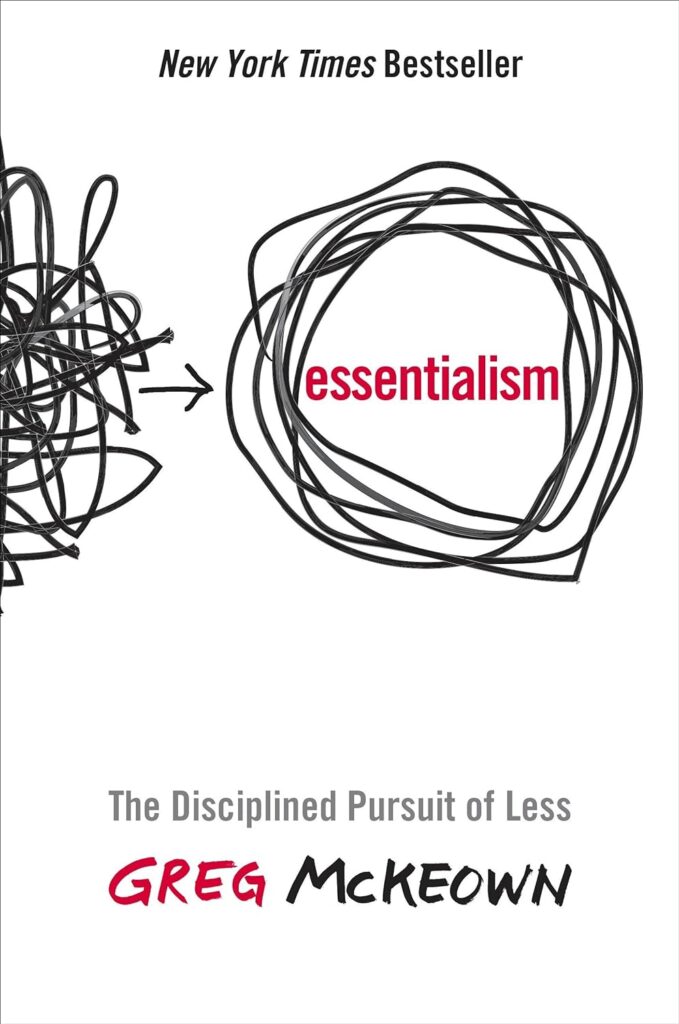
“Essentialism: The Disciplined Pursuit of Less” is a book by Greg McKeown that introduces the concept of essentialism, a systematic approach to identifying and focusing on what’s truly important in life.
The book argues that we often get caught up in the “paradox of success”, where our success leads to more options and opportunities, which can distract us from what would otherwise be our highest level of contribution. McKeown suggests that by giving ourselves permission to stop trying to do it all and to stop saying yes to everyone, we can make our highest contribution towards the things that really matter.
Essentialism is not about doing more things, but about doing the right things. It’s about distinguishing the vital few from the trivial many, eliminating the non-essentials, and then removing any obstacles so the essential things have a clear, smooth passage. The book encourages us to live by design, not by default.
The book also provides practical strategies for determining where our highest point of contribution lies, and then making execution of those things almost effortless. It empowers us to regain control over how we make decisions and use our time, energy, and attention.
In summary, “Essentialism” is a guide to help you streamline your work and simplify your life. It’s about figuring out essential activities rather than advocating doing less for the sake of it. It offers a new way to look at productivity and success, focusing on quality over quantity.
5. Slow Productivity by Cal Newport
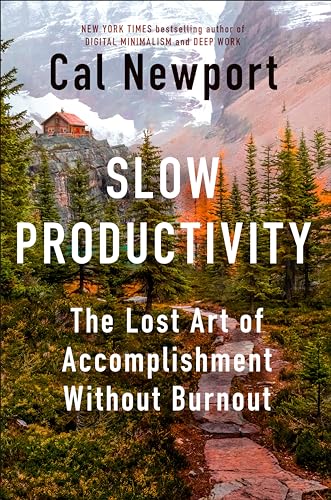
“Slow Productivity: The Lost Art of Accomplishment Without Burnout” is a book by Cal Newport that introduces a new philosophy for a better relationship with work. The book offers a holistic approach to productivity, focusing on making meaningful contributions at a sustainable pace.
The book is rooted in three pillars:
1. Fewer commitments: The book encourages reducing obligations so you have time to work on and accomplish what matters most.
2. Taking our time: It emphasizes working at a natural pace and not rushing your most important work.
3. Insisting on delivering high-quality work: The book promotes an obsession with quality, arguing that high-quality work leads to more meaningful career results.
Newport critiques the modern knowledge work culture, where visible activity is often used as a proxy for productivity. He calls this “pseudo-productivity” and argues that it leads to a culture where it’s more important to look busy than to complete meaningful tasks.
The book also discusses the concept of working ‘seasonally’ and how this approach can lead to better results. It suggests that developing meaningful work over long periods of time while maintaining focus on these projects can lead to more significant outcomes.
In summary, “Slow Productivity” is about escaping the overload of modernity to focus on a timeless and meaningful approach. It provides a more sustainable path towards achievements, advocating for a shift from busyness to producing lasting work at a slower pace.
6. The End of Procrastination by Petr Ludwig and Adela Schicker
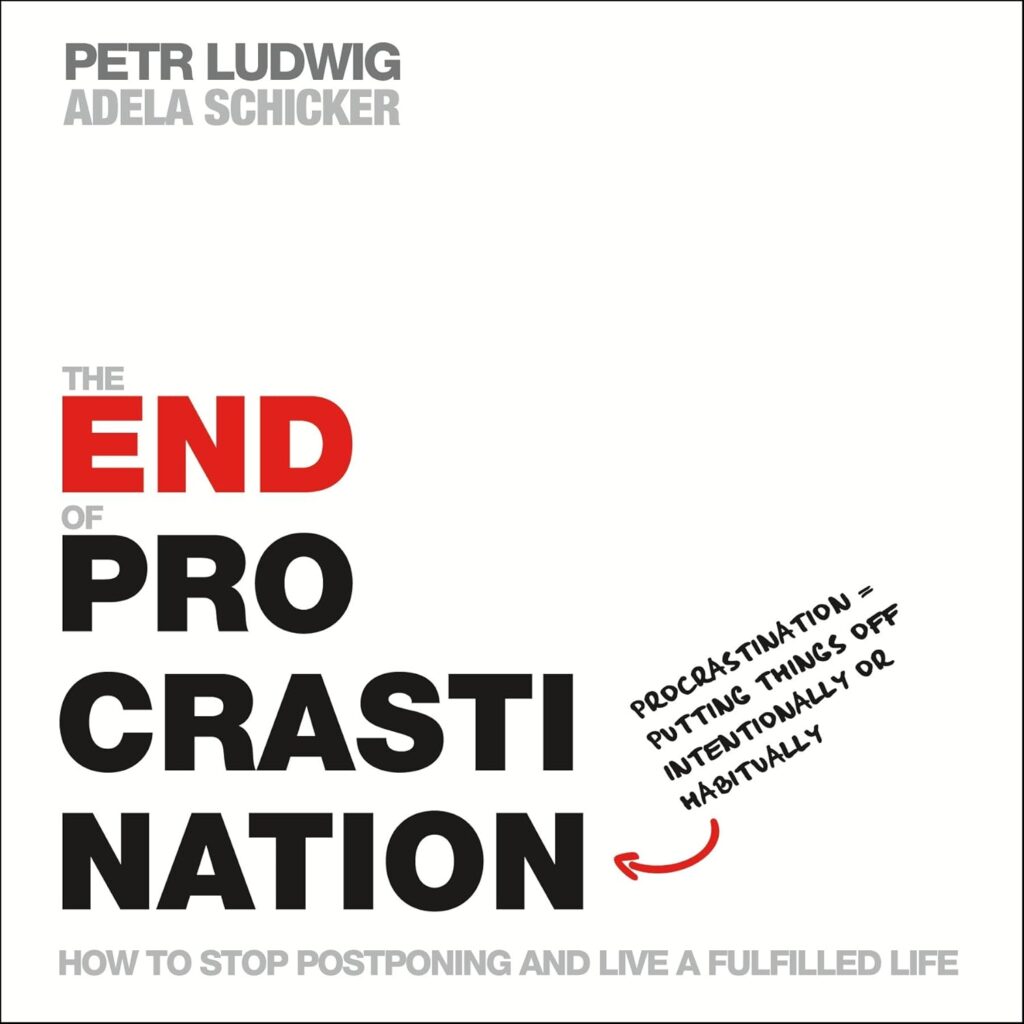
“The End of Procrastination” by Petr Ludwig and Adela Schicker is a book that offers a comprehensive guide to understanding and overcoming procrastination. The authors combine psychological insights, practical tools, and time management strategies to provide a holistic approach to tackling this common problem.
The book is dedicated to improving your long-term motivation and helping you get the most out of your life. It provides practical tools for immediate use and is based on over 120 scientific studies.
The authors show that ending procrastination is more than a wise time management strategy – it’s essential to developing a sense of purpose and leading a happier, more fulfilled life. With eight clear, approachable tools – from quick daily worksheets to shift your perspective to to-do lists that actually help you get things done – the book provides everything you need to change the way you manage your time and live your life.
By understanding exactly why procrastination happens and how our brains respond to motivation and self-discipline, the book provides readers with the knowledge to conquer procrastination on an everyday basis.
In summary, “The End of Procrastination” offers science-based, practical tools to overcome postponement and live a fulfilled life. It provides everything you need to change how you manage your time, pick priorities, and tackle your daily tasks.
7. Atomic Habits by James Clear
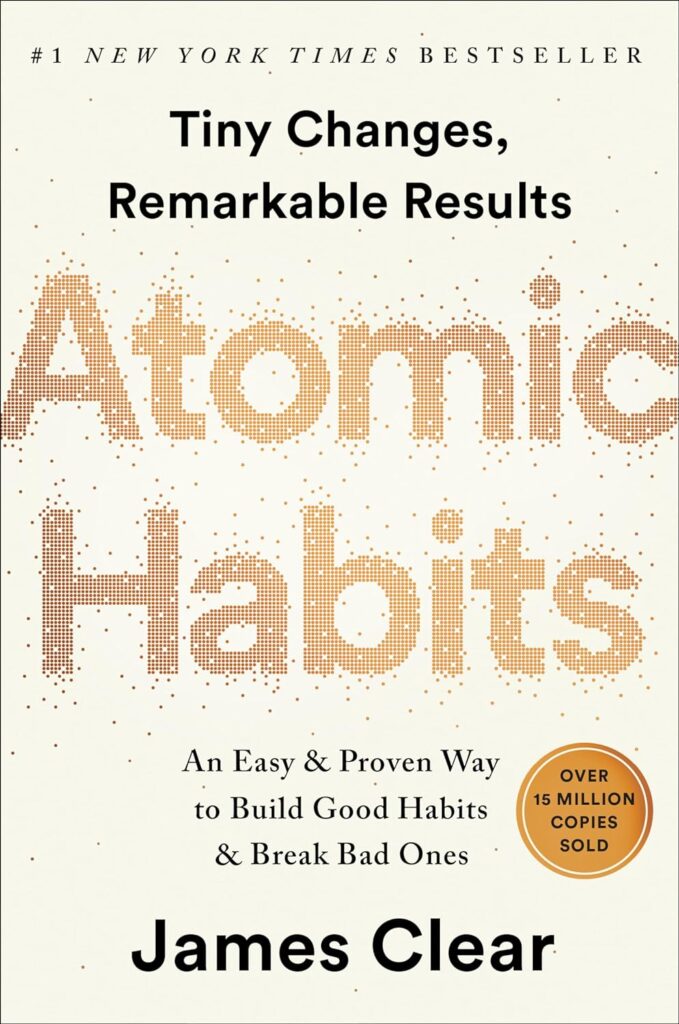
“Atomic Habits” by James Clear is a comprehensive guide on how to change your habits and get 1% better every day. The book introduces a framework called the Four Laws of Behavior Change, which provides a simple set of rules for creating good habits and breaking bad ones.
The book emphasizes that small habits make a big difference. It suggests that improving by 1 percent isn’t particularly notable—sometimes it isn’t even noticeable—but it can be far more meaningful, especially in the long run. The difference a tiny improvement can make over time is astounding.
The book also encourages readers to focus on their system instead of setting goals. Goals are about the results you want to achieve, while systems are about the processes that lead to those results. If you’re having trouble changing your habits, the problem isn’t you. The problem is your system.
Another key concept introduced in the book is building identity-based habits. Your current behaviors are simply a reflection of your current identity. To change your behavior for good, you need to start believing new things about yourself.
In summary, “Atomic Habits” provides practical strategies to overcome procrastination and live a fulfilled life. It offers a new way to look at productivity and success, focusing on quality over quantity.
8. The 4-Hour Workweek by Tim Ferriss
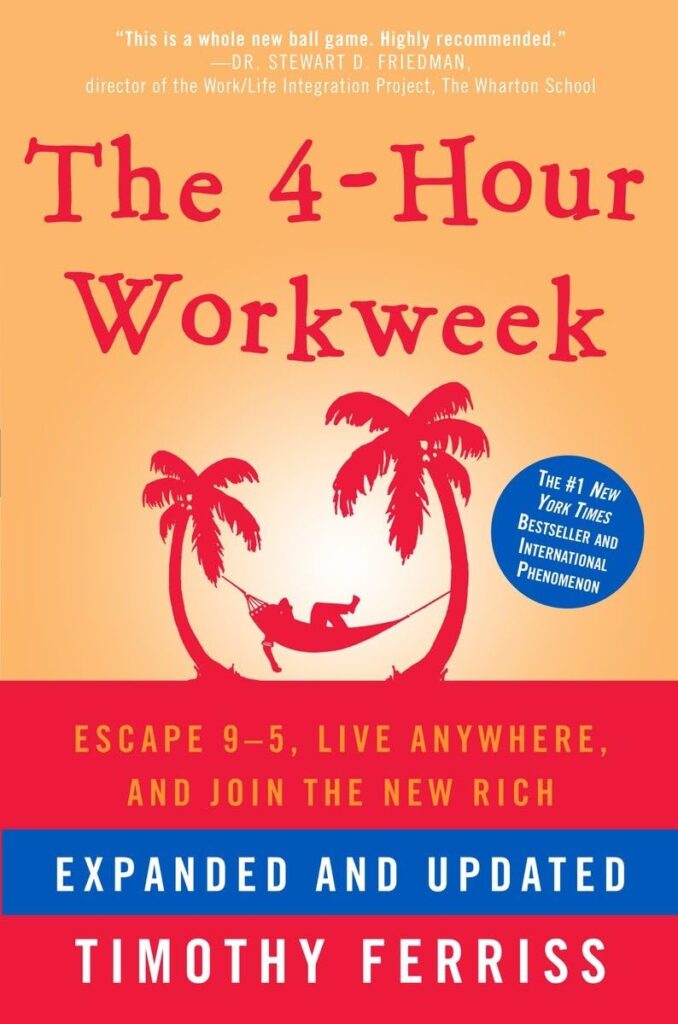
“The 4-Hour Workweek: Escape 9-5, Live Anywhere, and Join the New Rich” by Tim Ferriss is a groundbreaking book that challenges the traditional concept of work and career.
The book introduces the concept of ‘lifestyle design’ and rejects the old notion of retirement and the deferred-life plan. Ferriss argues that there is no need to wait, especially in unpredictable economic times, and every reason not to.
The book provides a step-by-step guide to luxury lifestyle design. It teaches readers how Ferriss himself transformed his work life, going from working 80 hours per week for $40,000 per year to earning $40,000 per month while working just 4 hours per week.
Ferriss shares strategies on how to outsource your life to overseas virtual assistants for $5 per hour and do whatever you want. He also shares how to travel the world without quitting your job, how to eliminate 50% of your work in 48 hours using the principles of a forgotten Italian economist, and how to trade a long-haul career for short work bursts and frequent “mini-retirements”.
The book includes more than 50 practical tips and case studies from readers who have doubled their income, overcome common sticking points, and reinvented themselves using the original book as a starting point. It also provides real-world templates you can copy for eliminating email, negotiating with bosses and clients, or getting a private chef for less than $8 a meal.
Overall, “The 4-Hour Workweek” is a blueprint for escaping the rat race, experiencing high-end world travel, or earning a monthly five-figure income with zero management. It’s a valuable resource for anyone looking to reimagine their careers and lives.
9. The Productivity Project by Chris Bailey
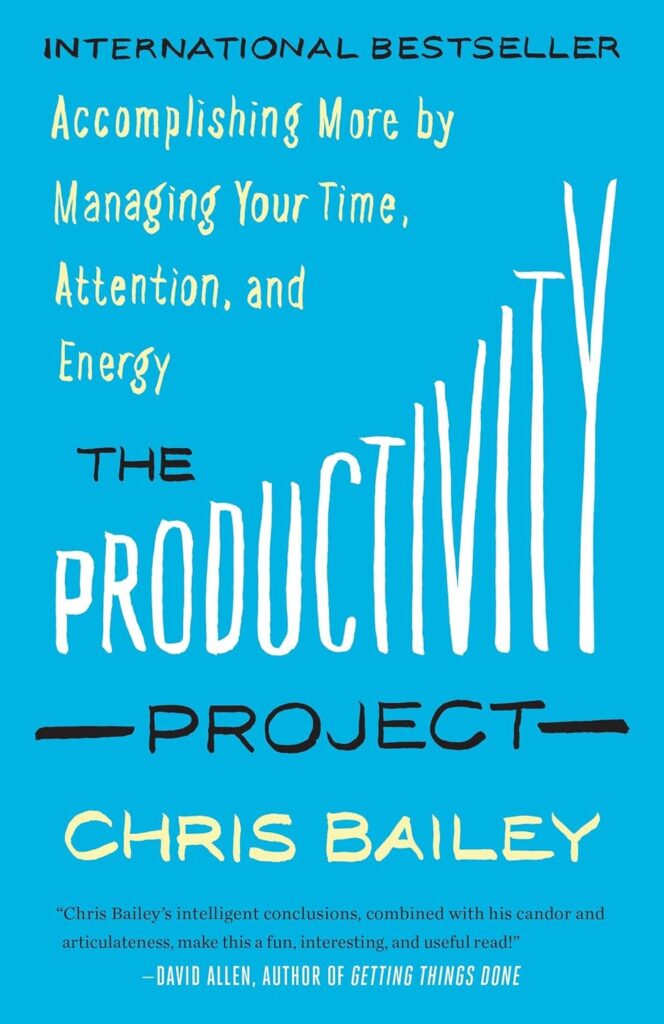
“The Productivity Project: Accomplishing More by Managing Your Time, Attention, and Energy” by Chris Bailey is a practical guide that provides a comprehensive approach to productivity.
The book is based on Bailey’s personal year-long series of productivity experiments, where he also continued his research and interviews with some of the world’s foremost productivity experts. He conducted various experiments on himself, such as going several weeks with little to no sleep, cutting out caffeine and sugar, living in total isolation for 10 days, using his smartphone for just an hour a day for three months, gaining ten pounds of muscle mass, stretching his work week to 90 hours, and getting up at 5:30 every morning for three months.
Bailey shares the 25 most powerful productivity tactics he encountered during his exploration. These tactics are distilled from the hundreds he experimented with and are woven together with stories from his productivity experiments.
The book offers insights on how to slow down to work more deliberately, shrink or eliminate the unimportant, strive for imperfection, schedule less time for important tasks, distract yourself from inevitable distractions with the 20-second rule, and embrace the concept of productive procrastination.
Overall, “The Productivity Project” offers a treasure trove of insights and over 25 best practices that will help you accomplish more. It’s a valuable resource for anyone seeking to improve their productivity and achieve their goals.
10. First Things First by Stephen R. Covey
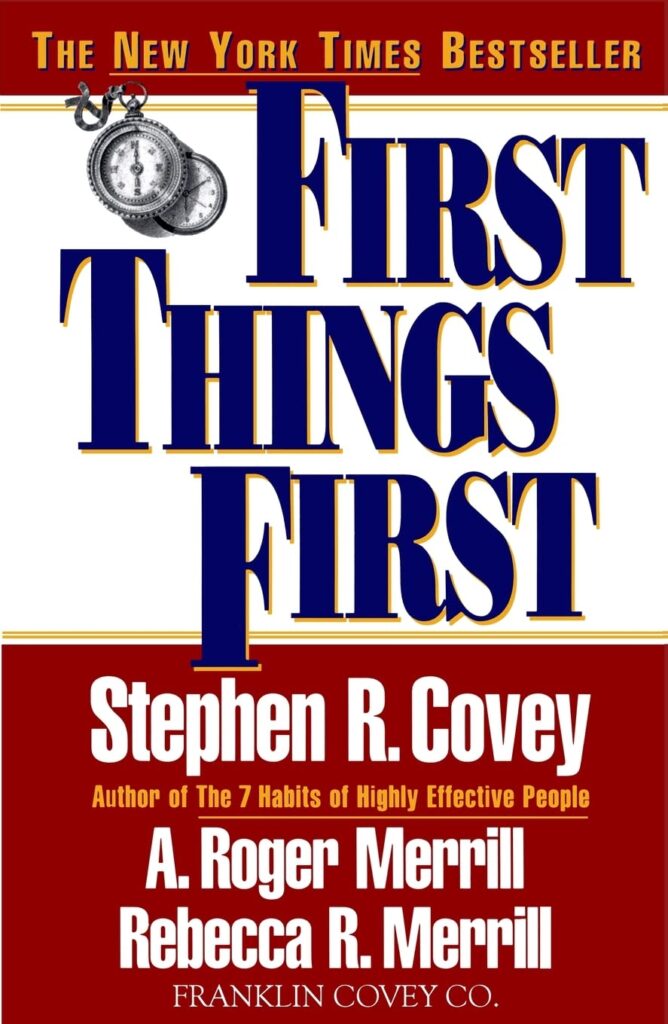
“First Things First” is a book by Stephen R. Covey, who is also the author of “The 7 Habits of Highly Effective People”. This book presents a time management approach that focuses on priorities, or “first things”. The main idea is to use your time effectively rather than efficiently, which means focusing on what you’re spending your time on by prioritizing tasks that have the most impact on your long-term goals.
The book introduces the concept of the clock and the compass. The clock represents our commitments, appointments, schedules, goals, activities – what we do with our time. The compass represents our vision, values, principles, mission, conscience, direction – what we feel is important and how we lead our lives.
Covey advocates categorizing tasks by urgency and importance so that you can focus on what actually needs to be done in the limited amount of time that you have. He emphasizes the need to forget what’s urgent and focus only on what’s important.
The book also introduces the concept of the four quadrants of time management, which helps you to prioritize tasks based on their importance and urgency. It encourages you to develop a vision for the future, build the right relationships, and become a strong leader wherever you go.
In summary, “First Things First” is about figuring out what’s important, prioritizing those things in your life, and developing strategies to manage time effectively. It’s a guide to help you balance your personal and professional responsibilities and to create a meaningful and fulfilling life.
You Might Also Like:
- Discover Your Next Great Read: New York Times Best-Selling Books
- 7 Must-Read Books Before Turning 25
- Crack the Code to Wealth: “The Algebra of Wealth” by Scott Galloway
- Discovering True Wealth in The Book ‘The Wealth Money Cannot Buy’ by Robin Sharma (Book Summary)
- Book Summary: Just the Good Stuff by Jim VandeHei – Redefining Success
- 7 Must-Read Books for Money Management